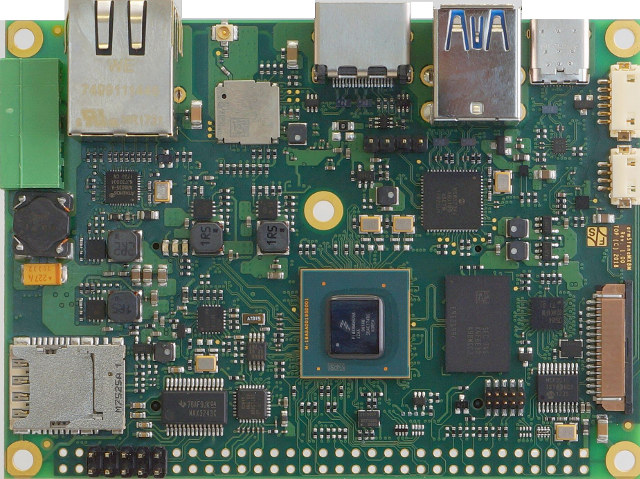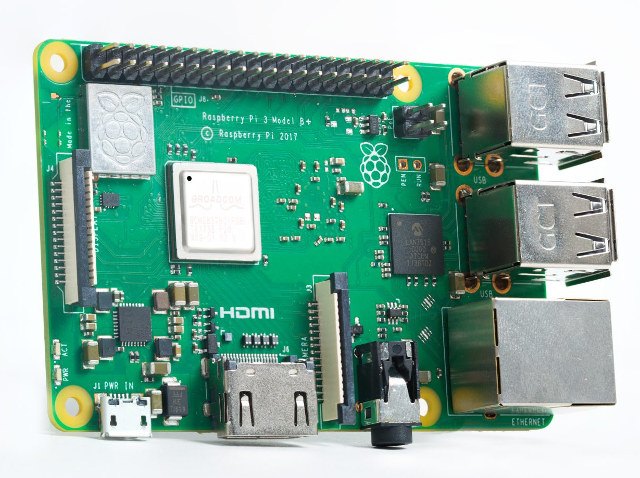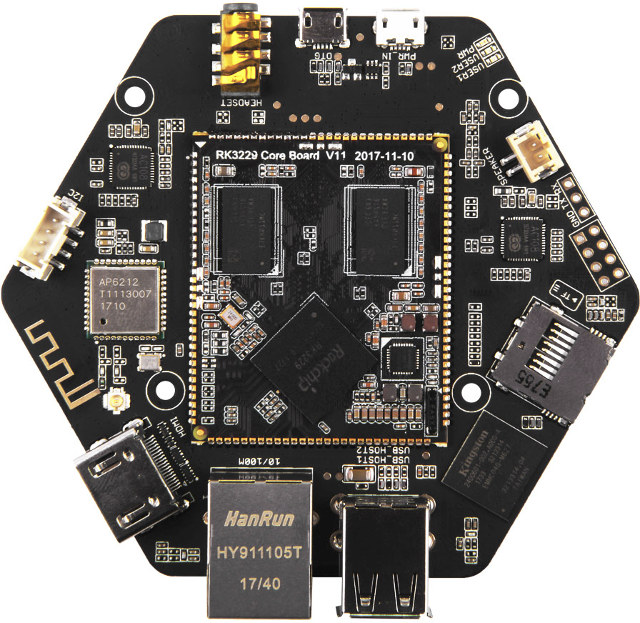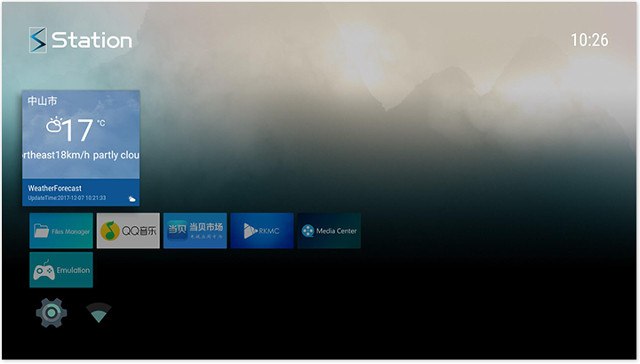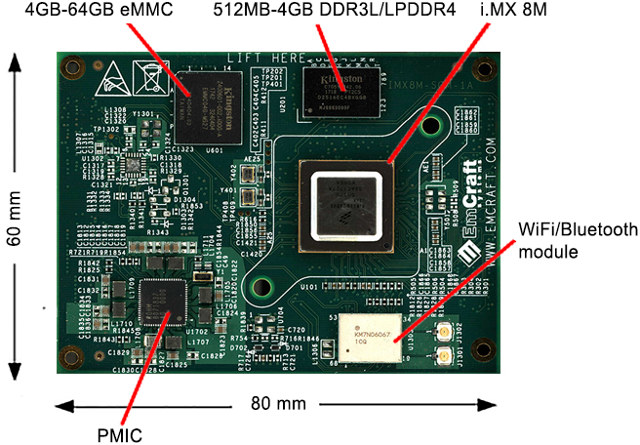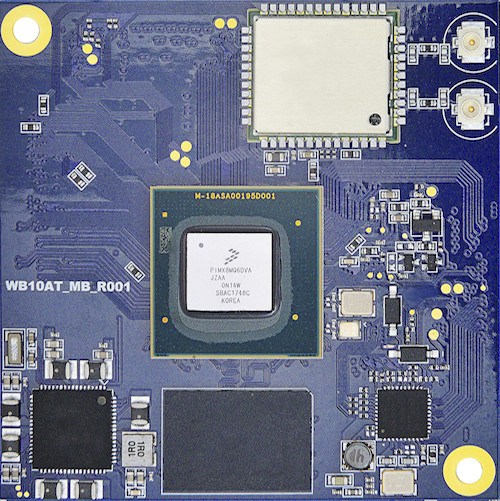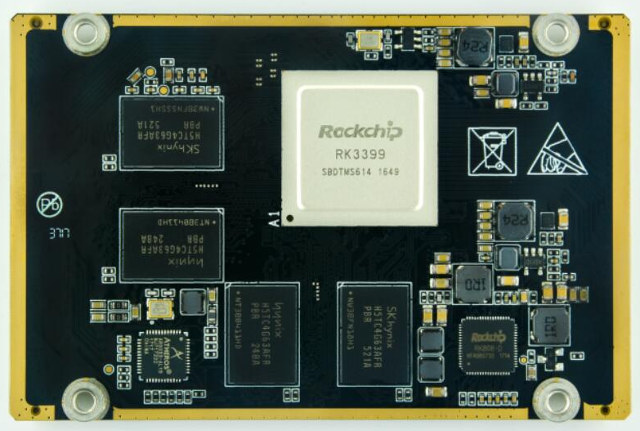F&S Elektronik Systeme has been working on a new SBC part of their ArmStone family with ArmStone MXM8 single board computer, featuring NXP i.MX 8M quad core Cortex A53 processor, and supporting up to 8GB LPDDR4 RAM. The Pico-ITX board also comes with up to 32GB eMMC flash, integrate Gigabit Ethernet and wireless connectivity, DVI and dual-channel LVDS outputs, USB 3.0, PCIe and more interfaces. The layout is very similar to the company’s ArmStone A53SD pico-ITX board launched last year with a Qualcomm Snapdragon 410E processor. ArmStone MXM8 preliminary specifications: SoC – NXP i.MX 8M Dual or Quad Arm Cortex A53 processor @ up to 1.5 GHz, Arm Cortex-M4 real-time core, and Vivante GC7000Lite GPU with support for OpenGL/Es 3.1, OpenGL 3.0, Vulkan System Memory – Up to 8GB LPDDR4 Storage – Up to 32GB eMMC flash, up to 1GB SLC NAND flash, optional micro SD slot Video Output – […]
$35 Raspberry Pi 3 Model B+ Launched with a Faster Processor, 802.11ac WiFi, Gigabit Ethernet, and Optional PoE
The Raspberry Pi Foundation has just introduced a updated version of their popular Raspberry Pi 3 Model B board with a Model B+ that increases the processor clocked up to 1.4 GHz, adds dual-band 802.11ac WiFi, and Bluetooth 4.2, Gigabit Ethernet (via USB 2.0 to Ethernet bridge), as well as support for PoE (Power-over-Ethernet) via an external HAT add-on board. Raspberry Pi 3B+ specifications: SoC – Broadcom BCM2837B0 64-bit ARMv8 quad core Cortex A53 processor @ 1.4GHz with dual core VideoCore IV GPU System Memory – 1GB LPDDR2 Storage – micro SD slot Video & Audio Output – HDMI 1.4 and 4-pole stereo audio and composite video port Connectivity – Gigabit Ethernet (via Microchip LAN7515 USB 2.0 to GbE bridge), maximum throughput 300 Mbps), WiFi 802.11 b/g/n/ac and Bluetooth 4.2 LE (via Cypress CYW43455 based module) USB – 4x USB 2.0 host ports, 1x micro USB port for power […]
ReSpeaker Core v2 is a 6-Mic Array Audio Development Kit Powered by Rockchip RK3229 Processor
Seeed Studio launched ReSpeaker Core board designed for voice interaction in 2016. The board was based on a Mediatek MT7688 MIPS WiSoC running OpenWrt, and came with a single built-in microphone, although a microphone array board with 7 microphones and 12 LEDs was also offered as option. The company is now back with a more powerful update of the board – called ReSpeaker Core v2 – featuring Rockchip RK3229 quad core Cortex A7 processor, running Debian Linux, and with 6 on-board microphones. Beside WiFi connectivity, the board also adds Ethernet and Bluetooth 4.0, as well as a USB hot port compared to the previous version. ReSpeaker Core v2 specifications: SoC – Rockchip RK3229 quad core Cortex A7 processor @ up to 1.5 GHz with Arm Mali-400MP2 GPU System Memory – 1GB DDR3 RAM Storage – 4GB eMMC flash, micro SD card slot Video Output – HDMI 2.0 (but drivers not […]
Android based Station OS Firmware Focuses on Multimedia and Retro Gaming for ROC-RK3328-CC and Firefly-RK3399 Boards
If you’re interesting in gaming and multimedia, one choice is to run Linux based RetrOrangePi or RetroPie on your favorite development board/SBC, and soon, with the upcoming release of Kodi 18, multimedia and retro gaming will just be an app installation away in Android, and other supported operating systems, since RetroPlayer retro-gaming emulator is part of the latest – and yet-to-be-released – version of Kodi. In the meantime, if you own a ROC-RK3328-CC and/or Firefly-RK3399 board(s), you may want to try Station OS, a firmware based on Android with a focus on 4K video playback and retro gaming. The description claims that Stations OS includes “more than 20 kinds of optimization for video and games, achieve multimedia center, Kodi 4K hardware decoding, game simulator hardware acceleration, real-time cast screen display, network acceleration, perfect Root.” The firmware does not use Kodi directly, but RKMC fork instead with some improvements, and they […]
Emcraft Introduces NXP i.MX 8M SoM and $299 Starter Kit
I first discovered Emcraft Systems in 2011 through their work porting uCLinux to Arm Cortex M3/M4 microcontrollers, and since then the company has kept on working microcontroller software and hardware, but also moved to Arm Cortex A class solutions. Like most embedded systems companies, Emcraft engineers have also designed their own NXP i.MX 8M system-on-module, but while many have still not announced pricing, and/or show “in development” or “early product announcement” in their product page, Emcraft has started taking pre-order for their i.MX 8M SoM Starter Kit for $299, with shipping scheduled for May 21, 2018 or before. Let’s check out SOM-IMX8M specifications first: SoC – NXP i.MX8M Quad processor with 4x Cortex A53 cores, 1x Cortex-M4F core, and a Vivante GC7000Lite GPU System Memory – 512MB to 4GB DDR3L/LPDDR4 SDRAM Storage – 4 to 64GB eMMC flash Connectivity – Wireless module supporting 802.11 a/b/g/n/ac 2×2 MIMO WiFi, Bluetooth 4.2, […]
Innocomm WB10 NXP i.MX8M Quad SoM Comes with WiFi, Bluetooth, and Ethernet Connectivity
Taiwan based Innocomm Mobile Technology has been working on their own NXP i.MX 8M quad core system-on-module – namely WB10 – which includes a wireless module with WiFi and Bluetooth, as well as a Gigabit Ethernet transceiver. The module connects to the carrier board through three 80-pin board-to-board connectors exposing many of the I/Os provided by the latest NXP processor. WB10 module specifications: SoC – NXP i.MX8M Quad processor with 4x Cortex A53 cores, 1x Cortex-M4F core, and a Vivante GC7000Lite GPU System Memory – 2GB LPDDR4-3200 Storage – 8GB eMMC flash Connectivity Gigabit Ethernet transceiver Wireless module supporting 802.11 a/b/g/n/ac 2×2 MIMO WiFi, Bluetooth 4.2, two u.FL antenna connectors on-module Power Management & Audio Codec – ROHM PMIC 3x 80-pin board-to- board (1.27mm pitch) connectors exposing: Display Interfaces – HDMI 2.0a with support for 4K HDR, MIPI DSI Audio Interfaces – 4x SAI, S/PDIF Rx/Tx, DSD512 Camera Interfaces – […]
C.H.I.P, PocketCHIP & Voder’s Maker Next Thing Co. Is Still Up and Running (Correction)
[Update: Next Thing Co. CEO (Dave) contacted me to inform me the company was not closed, but there was just several unfortunate events: DNS problem with the site leading to the blog issue Next Thing Co Facebook page was closed months ago (due to too many requests from different sources) The Google Maps listing is not managed by Next Things Co themselves. I’ve left the rest of the post unchanged. (except the last sentence) ] Next Thing Co. introduced the $9 C.H.I.P computer powered by Allwinner A13/R8 in 2015, and worked with Free Electrons (now Bootlin) to bring mainline Linux to the platform. They also launched PocketCHIP portable Linux game console based on the module, and lateron introduced C.H.I.P Pro WiFi + BLE module based on Allwinner GR8 processor, and found in their Voder (previously Dashbot) car dashboard assistant. I’m actually still using a C.H.I.P board as a printer server, […]
OpenEmbed Launches $99 em3399 Rockchip RK3399 SoM, and a Compact Evaluation Kit
Looking for a system-on-module based on Rockchip RK3399 processor? So far, you had at least four options with either edge connectors or castellated holes: Theobroma RK3399-Q7 (Qseven) SoM, 9Tripod X3399 core, Boardcon PICO3399 CPU module, or Firefly-RK3399 CoreBoard. OpenEmbed now offers another RK3399 system-on-module with their em3399 SoM using board-to-board connectors interfacing with the carrier board. OpenEmbed em3399 system-on-module specifications: SoC – Rockchip RK3399 hexa-core processor with 2x Cortex-A72 cores, 4x Cortex-A53 cores, and a Arm Mali-T860MP4 GPU System Memory – 2GB or 4GB DDR3L RAM Storage – 16GB to 128GB eMMC 5.1 flash Connectivity – Gigabit Ethernet transceiver (Atheros AR8033) Power Management – Rockchip RK808D PMIC 2x 120-pin board-to-board connectors (0.8mm pitch) with: Display: HDMI 2.0 port with audio for up to 4K @ 60Hz DisplayPort 1.2 with audio for up to 4K @ 60Hz MIPI-DSI (dual-channel) at up to 2560×1600 @ 60 Hz eDP 1.3 (4-lane) Camera – […]


